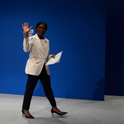I am trying to imagine Kemi Badenoch in June 1940. “We shall not yet fight on the beaches,” she might have said. “We need a reality check before we commit to fighting on the landing grounds. We will not rush to fight in the fields and in the streets. We are not going to set a random target for fighting in the hills. It’s all very well to promise ‘we shall never surrender’—but we have to consider whether it would mean a drop in our living standards.”
“This is not the end,” she might have concluded with a rhetorical flourish. “It is not even the beginning of the end. But it is, perhaps, the end of the beginning of a consultation process to assess whether a period of reflection is necessary before scrapping arbitrary woke goals about what it means to ‘win.’”
Unfair? But who’s to say whether the threat to millions from climate change is any less urgent or existential than the threat from Hitler when Churchill made his famous speech? He was trying to inject a sense of crisis and resolve into a nation that had been beguiled into a hopelessly false sense of security by the appeasers who did nothing while claiming that talk of war was irresponsible and unnecessary.
There are parallels.
I’m not making a direct comparison between appeasement and those who now line up to denounce net zero, the target to which every Conservative leader since Cameron—barring Badenoch—had committed. But neither is the comparison entirely ridiculous.
It is, thankfully, mostly considered beyond the pale to be an outright climate change denier these days, though such creatures are occasionally to be glimpsed on GB News. But it is deemed entirely acceptable to be in the camp that rubbishes the only agreed framework that Britain has to help prevent the world from heating up in a way that will make our own grandchildren’s lives precarious, and will threaten the lives of many millions of others.
The political calculation is a risky one. According to most polls, net zero is a broadly popular aspiration, even if people understandably worry about the cost. YouGov found last month more than 60 per cent of us “strongly or somewhat” support the aim of cutting carbon emissions to net zero by 2050, with only 24 per cent on the other side of the ledger. The difficulty is that Nigel Farage is opposed, and—for now, anyway—he exerts a centripetal force that sucks in anyone too weak to stand firm.
Of course, it’s perfectly legitimate to question both the goals and the timescale for reducing emissions that parliament agreed on in 2019. Tony Blair garnered a rush of headlines this week for appearing to do just that in the foreword he wrote for a report by his own institute.
But the report itself was more concerned with the psychology, narrative, and politics of achieving the goal of zero emissions. At least a third of the report offered ideas and solutions to achieve roughly the same goal.
What sticks in the gullet is the small, but growing, tribe of pontificators, politicians and columnists who can be relied on to mock and demolish net zero without suggesting any alternatives. This is just climate denialism in a posh suit. If the best you can do for our grandchildren is shrug your shoulders, history will not be kind.
It’s not clear that Badenoch herself currently has any ideas to offer. As a guest on the Peston show recently, she sat slab-faced as Anushka Asthana rattled through a few charts to suggest that she doesn’t have much of a clue about this issue. Badenoch’s best riposte was that China might be using child slave labour to produce solar panels. Which, if true, is indeed shameful. But what’s your alternative, Kemi?
Badenoch seems to be drawn to culture war issues like a moth to a bright flame. Two weeks ago, she used up all six questions at PMQS to needle Starmer about the transgender controversy. This week all six questions were devoted a proposed inquiry into grooming gangs. Both important subjects. But meanwhile the Middle East is in flames; the war in Ukraine is still raging. There are off-the-scale crises over trade and defence alliances. The threat/opportunity of AI hastens by the day. Our erstwhile closest ally is in some form of constitutional meltdown. And each year the world gets progressively hotter.
Meanwhile the Conservative party leader wants to stoke a culture war around how to obstruct the people trying to mitigate it.
What an opportunity for journalism to bring some calm perspective to the issue and to root the debate in actual facts. But, alas, too many editors find it easier to join in the culture war than stick to the evidence. And that’s not counting the BBC, which has apparently decided that heat pumps are too polarising and has told the host of a podcast on the issue, Evan Davis, that discussing the technology risks “treading on areas of public controversy.”
If the craft of journalism stands for anything, it stands for the separation of news from comment. And it stands for the ability to use cool detachment to locate reliable evidence and to explain it simply.
Sadly, that form of journalism doesn’t appeal to a lot of people now spotting, in net zero, an opportunity to open a new front in the culture wars. It’s, in general, not the fault of the foot soldiers, but the media big cheeses who believe that ideology sells better than humble old facts.
So noise replaces science. The shouters drown out the quietly knowledgeable. Slogans supplant debate. And once again we allow an ignorant populist to dictate the terms of the argument.
What Churchill would have made of it? I don’t think he’d be sitting on his hands.













